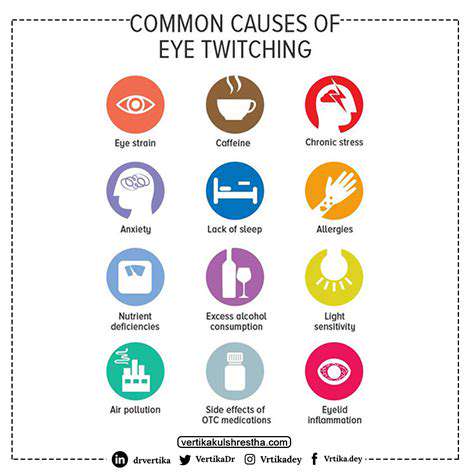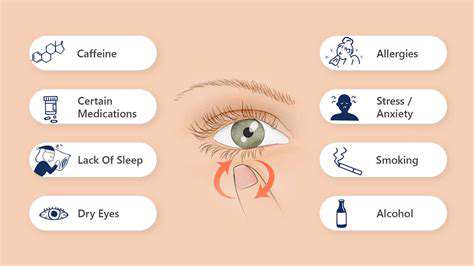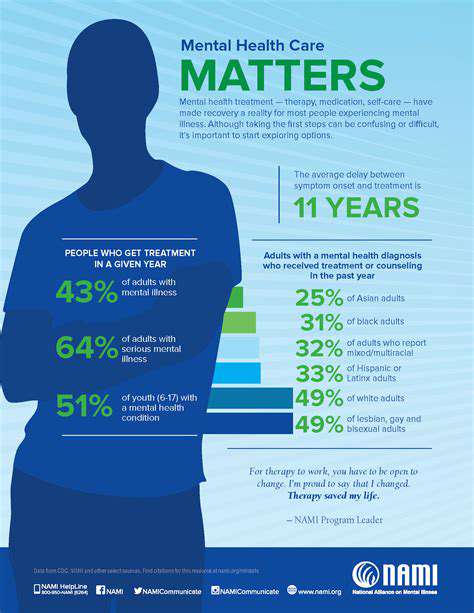Eye Twitching and Its Connection to Anxiety: Causes and Solutions
What is Eye Twitching?
Understanding Eye Twitching
Eye twitching, medically known as myokymia, refers to the involuntary spasm of the eyelid muscles. This common phenomenon often occurs in the upper or lower eyelid, resulting in brief, unsightly movements that can be slightly annoying. Eye twitching can happen sporadically or in more persistent episodes, and while it is generally harmless, it can be an indicator of underlying stress or fatigue.
Several factors contribute to the onset of eye twitching, including lack of sleep, excessive caffeine consumption, and eye strain from prolonged screen time. In some cases, nutritional deficiencies, particularly in magnesium, can also lead to eye twitching. Recognizing these potential triggers is essential for effectively managing the condition.
The Link Between Anxiety and Eye Twitching
Anxiety is a significant factor that can exacerbate or trigger eye twitching. When a person experiences heightened stress or anxiety levels, the body's muscles can become tense, leading to involuntary contractions. This tension often manifests in the eyelids, resulting in those annoying twitches that can become more pronounced during periods of anxiety. It's crucial for individuals experiencing these symptoms to identify and address their anxiety to minimize the physical manifestations.
Moreover, chronic anxiety can lead to sleep disturbances, which further intensifies the potential for eye twitching. Establishing healthy coping mechanisms, such as mindfulness, relaxation techniques, or professional therapy, can help reduce anxiety levels and, in turn, alleviate the frequency and intensity of eye twitching.
The Link Between Anxiety and Eye Twitching
The Physiological Response to Anxiety
Anxiety triggers a range of physiological responses in the body. One common reaction is muscle tension, which can occur in various parts of the body, including the eyes. This tension may lead to involuntary muscle contractions, resulting in eye twitching.
When faced with stress, the body produces adrenaline, a hormone that prepares it for fight or flight. This can cause muscles to become more sensitive and prone to involuntary spasms, including those around the eyes.
Moreover, anxiety can lead to decreased tolerance for discomfort, making a person more aware of bodily sensations that might otherwise go unnoticed. This heightened sensitivity can amplify the perception of eye twitching.
Understanding the physiological link between anxiety and muscle spasms can help individuals recognize that their eye twitching may be a response to broader stressors in their lives, rather than a standalone issue.
By addressing the anxiety that underlies these physiological responses, individuals may find relief not only from anxiety itself but also from associated symptoms like eye twitching.
Common Triggers of Eye Twitching Related to Anxiety
Several triggers can exacerbate eye twitching in individuals experiencing anxiety. High levels of stress from work or personal relationships often lead to heightened anxiety, which can in turn cause more frequent twitching.
Poor sleep quality is another significant factor; anxiety can disrupt sleep patterns, leading to fatigue and increased muscle spasms. A lack of rest makes the body's muscles, including those around the eyes, more prone to twitches.
Increased caffeine consumption is also commonly linked to anxiety. Caffeine is a stimulant that can exacerbate symptoms of anxiety and contribute to muscle tension, resulting in more eye twitching.
Dehydration and poor nutrition can be additional factors, as they affect overall bodily function and muscle health. Individuals under stress may neglect proper hydration or diet, which can contribute to muscle spasms.
By identifying and managing these triggers, individuals may be able to reduce instances of eye twitching associated with their anxiety symptoms.
Strategies for Managing Eye Twitching Linked to Anxiety
To manage eye twitching linked to anxiety, individuals can adopt various relaxation techniques to reduce overall stress levels. Practices like deep breathing, meditation, and mindfulness can help calm the mind and body, diminishing triggers for twitching.
Regular physical activity is another effective way to reduce stress and anxiety. Exercise releases endorphins, which naturally enhance mood and reduce muscle tension throughout the body.
Implementing a consistent sleep routine can also play a critical role. Ensuring adequate sleep helps promote muscle recovery and reduces fatigue, thereby alleviating muscle spasms that could lead to twitching.
Additionally, monitoring caffeine and alcohol intake can significantly impact anxiety levels and muscle relaxation. Reducing these stimulants may lead to fewer instances of eye twitching.
Lastly, if anxiety is severe, seeking professional help, such as therapy or counseling, can provide valuable tools to manage both anxiety and its physical manifestations, including eye twitching.
The Importance of Professional Help for Persistent Symptoms
While occasional eye twitching is often harmless, persistent symptoms warrant a consultation with a healthcare professional. A doctor can help determine whether the twitching is solely related to anxiety or indicative of another underlying condition.
Professional assessment enables individuals to explore appropriate treatments, such as therapy or medication, which can help address both anxiety and its physical symptoms.
In some cases, eye twitching may be linked to neurological conditions or other health issues. Thus, a comprehensive evaluation can rule out more serious concerns and provide peace of mind.
A healthcare provider may also recommend lifestyle adjustments or alternative therapies that can enhance relaxation and reduce anxiety, contributing to overall physical well-being.
Ultimately, understanding the connection between anxiety and eye twitching and seeking guidance from professionals can lead to more effective management of symptoms and improved quality of life.
Common Triggers of Eye Twitching Related to Anxiety

Stress and Overwhelm
One of the most significant triggers of eye twitching related to anxiety is high levels of stress. When individuals experience overwhelming stress, their bodies react in various ways, including the onset of involuntary muscle spasms. This reaction can often manifest as eye twitching, causing discomfort and distraction during daily activities.
Identifying stressors in your life is crucial to managing eye twitching. Whether they are work-related pressures, personal relationships, or other life challenges, understanding their source can aid in implementing coping strategies.
To alleviate stress, techniques such as mindfulness, deep breathing exercises, and engaging in hobbies can be beneficial. These approaches not only help reduce anxiety but can significantly ease the frequency of eye twitches.
Lack of Sleep
Sleep deprivation is another common trigger for eye twitching and anxiety. Without adequate sleep, the body struggles to function normally, leading to physical symptoms such as eye twitching. Moreover, the fatigue can exacerbate feelings of anxiety, creating a vicious cycle that is challenging to break.
Prioritizing restorative sleep is essential for overall well-being. Establishing a regular sleep routine, creating a conducive sleep environment, and limiting screen time before bed can help improve sleep quality.
In some cases, individuals may need to consult a healthcare provider if sleep issues persist. Tackling sleep problems directly can ultimately lead to a reduction in eye twitching caused by anxiety.
Caffeine and Stimulants
Excessive consumption of caffeine and other stimulants can significantly impact the frequency of eye twitching. Stimulants increase nervous system activity, which can lead to heightened anxiety levels and subsequent muscle spasms, including in the eyes. Many people may not recognize how much caffeine they consume daily, which can contribute to this issue.
To mitigate eye twitching, consider reducing your intake of caffeinated beverages such as coffee, tea, and energy drinks. Opting for herbal teas or decaffeinated options can be a healthier choice for those sensitive to stimulants.
Keeping track of your daily caffeine consumption can help identify anything that may aggravate your symptoms. Discussing other dietary options with healthcare professionals may also provide further insights into managing anxiety and twitching.
Eye Strain and Fatigue
Prolonged periods of screen time often lead to digital eye strain, which can contribute to eye twitching. As people spend more time on computers and mobile devices, the eyes can become fatigued, leading to involuntary muscle contractions. This strain can be worsened by anxiety, creating a dual problem that manifests physically.
To reduce eye strain, it is essential to take regular breaks from screens. One effective method is the 20-20-20 rule—every 20 minutes, look at something 20 feet away for at least 20 seconds to ease the eyes.
Incorporating periods of rest and incorporating eye exercises can also help. Additionally, ensuring proper lighting and ergonomics while using screens can make a considerable difference in reducing eye twitching related to strain.
Mitigating Eye Twitching Linked to Anxiety

Understanding the Causes of Eye Twitching
Eye twitching, or myokymia, is often a benign condition but can be linked to various factors. One of the primary causes is stress and anxiety, which can lead to muscle tension and spasms. These spasms are generally harmless, but they can be bothersome and distracting. In addition to stress, other factors such as fatigue, caffeine intake, and eye strain may contribute to eye twitching. Recognizing the underlying causes can help in addressing and reducing the occurrence of this condition.
Effective Strategies to Manage Anxiety-Related Eye Twitching
Managing anxiety is crucial in minimizing episodes of eye twitching. Practicing relaxation techniques such as deep breathing, meditation, and progressive muscle relaxation can effectively reduce stress levels. Regular physical activity also helps alleviate anxiety symptoms and can thereby diminish eye twitching occurrences. It is also beneficial to establish a regular sleep schedule, ensuring you get adequate rest, as lack of sleep can exacerbate anxiety and muscle spasms. Furthermore, moderating caffeine and alcohol intake is key, as these substances can heighten anxiety and contribute to eye twitching.
When to Seek Professional Help
While most cases of eye twitching are harmless, certain situations warrant professional attention. If the twitching persists for an extended period or worsens, it may be a sign of underlying neurological issues. Additionally, if the twitching is accompanied by other symptoms such as drooping eyelids or changes in vision, consulting a medical professional is advisable. Understanding when to seek help is important to ensure that any potential concerns are addressed. Further, speaking with a mental health professional about anxiety management techniques can provide additional support and resources.
When to Seek Help

Understanding the Symptoms
Eye twitching can manifest in various forms, such as a mild spasm or an intense fluttering sensation. Many individuals might experience this phenomenon during particularly stressful periods in their lives. It’s essential to recognize that while eye twitching can often be benign, persistent symptoms may indicate underlying issues. Other symptoms accompanying eye twitching might include headaches, fatigue, or other involuntary muscle movements.
These accompanying symptoms might suggest that the body is attempting to cope with anxiety and stress levels. It's vital to be aware of how often and intense the twitching occurs. If it's happening frequently or interfering with daily activities, this is a sign to seek professional advice. Understanding the full range of symptoms can provide a clearer picture of one's health situation.
In some cases, the eye twitch might be linked to other medical conditions or environmental factors that could exacerbate anxiety, such as caffeine intake or lack of sleep. Keeping a symptom diary can help identify potential triggers and patterns related to eye twitching. This documentation can be invaluable when discussing the issue with a healthcare professional.
Awareness of your symptoms is crucial. The more information you can provide to a doctor, the better they can assist you in finding solutions. Ignoring the symptoms or attributing them solely to temporary stress can delay necessary treatment.
When to Consult a Professional
Consulting with a healthcare provider should be prioritized if eye twitching persists beyond a few days. Especially if it escalates, becomes painful, or affects vision, professional input is recommended. A medical professional can help rule out other serious conditions that might be manifesting through eye twitching. Early intervention can make a significant difference in effectively managing the symptoms.
If twitching is accompanied by additional symptoms such as drooping eyelids, facial spasms, or changes in vision, it may warrant immediate medical evaluation. These could signal more serious neurological conditions that require prompt attention. Your instinct and awareness of your body should guide you to seek help sooner rather than later.
Moreover, if you notice yourself feeling more anxious or stressed while dealing with eye twitching, this could indicate an increase in anxiety levels that also needs addressing. Consulting a mental health professional may be beneficial to develop coping strategies and alleviate underlying stressors. They can offer tools and resources to manage anxiety effectively, which may subsequently reduce physical symptoms like twitching.
In summary, if any of the symptoms described resonate with your experiences, consider reaching out to a healthcare professional for guidance. They can provide tailored advice and, if needed, treatment options to address both the anxiety and the physical manifestations.
Exploring Treatment Options
After consulting a healthcare provider, a range of treatment options may be discussed based on individual needs. Treatments can range from relaxation techniques, lifestyle modifications, to medical interventions if necessary. Cognitive behavioral therapy (CBT) has shown efficacy in treating anxiety-related symptoms, including eye twitching. This approach helps individuals confront and manage their anxious thoughts and feelings effectively.
In addition to therapy, lifestyle changes can also play a significant role in reducing anxiety levels. Simple practices such as regular exercise, adequate sleep, and balanced nutrition can contribute greatly to overall well-being. Reducing caffeine and alcohol intake may also mitigate eye twitching triggers.
For some individuals, medications might be prescribed to help manage anxiety levels, which in turn may reduce twitching episodes. However, it is crucial to work closely with a healthcare provider to determine the right approach for your situation. Finding the balance between medication and holistic methods can lead to comprehensive care.
Support groups can also provide comfort and understanding through shared experiences. Connecting with others who face similar challenges might foster a sense of community and support, which can be paramount in managing anxiety. These connections can empower individuals to adopt healthier coping mechanisms in a safe environment.
Self-Care Strategies
Implementing self-care strategies can be a powerful way to manage anxiety and eye twitching. Activities such as mindfulness meditation, yoga, and deep breathing exercises can be incredibly beneficial. Incorporating these practices into your daily routine can help reduce stress and promote relaxation. Consistency is key, as regular self-care allows the body to respond better to anxiety triggers.
Create a calming environment that encourages relaxation and stress relief. This can include decluttering your space, using soothing scents, or dedicating time to hobbies that you find enjoyable. Personalizing your environment to be more calming can significantly improve mental health and reduce sporadic symptoms like eye twitching.
Moreover, staying hydrated and nourished supports overall body function, which impacts anxiety levels. Consuming well-balanced meals filled with nutrients can promote better mental health. Many people might overlook the importance of hydration, but it directly influences energy levels and cognitive function.
Lastly, learning to recognize your anxiety triggers can help you prepare for and navigate stressors more effectively. Keeping a journal to note down instances of heightened anxiety may provide insights into your feelings and responses, ultimately aiding in effective management. These self-care strategies empower individuals to take control of their anxiety and physical symptoms.
The Importance of Holistic Care
Approaching eye twitching and anxiety from a holistic perspective can lead to more comprehensive care. Holistic practices include alternative therapies such as acupuncture, aromatherapy, and massage therapy that promote relaxation and stress relief. Integrating these into traditional treatment can be incredibly beneficial in managing symptoms. Holistic care emphasizes treating the person as a whole rather than focusing solely on isolated symptoms.
Nutrition plays a critical role in holistic health, as certain foods can help combat anxiety. Omega-3 fatty acids, found in fish, walnuts, and flaxseeds, have been shown to support brain health and reduce anxiety. Similarly, incorporating magnesium-rich foods can help reduce muscle tension, potentially alleviating symptoms like eye twitching.
Physical health is interconnected with mental well-being; thus, regular physical activity fosters both physical and emotional resilience. Engaging in activities you love, whether it’s dancing, hiking, or swimming, can serve to elevate mood and diminish anxiety. Creating a fulfilling routine that prioritizes both physical and emotional health sets the foundation for a positive lifestyle change.
Finally, ensure you maintain open lines of communication with your healthcare providers. They can help guide you through complex feelings and symptoms while recommending appropriate holistic practices. Combining medical advice with holistic practices can offer a balanced approach to health, helping individuals manage both anxiety and associated symptoms like eye twitching.